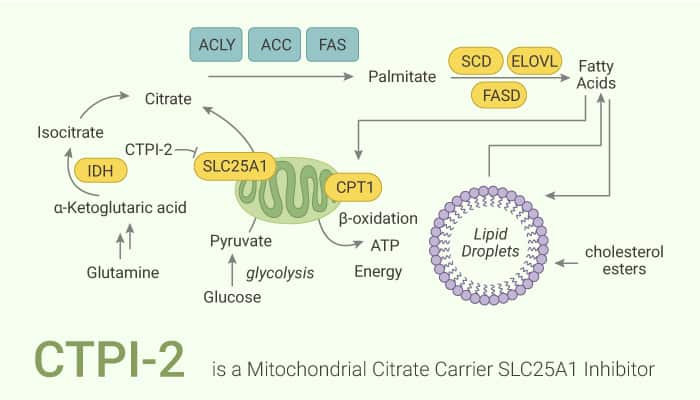Nonalcoholic fatty liver disease (NAFLD) and inflammatory steatohepatitis (NASH) comprise a series of manifestations that span from reversible hepatic steatosis to progressive necroinflammatory and fibrotic disease.
There exists a clear association between NASH with obesity, diabetes, and metabolic syndrome. Slc25a1 is a mitochondrial citrate carrier, which belongs to a family of ion transporters. Moreover, the activity of Slc25a1 links to several pathologic conditions including cancer, aging, and developmental disorders.
Slc25a1 plays an important role in the metabolic rewiring of tumor cells, in chemotherapy resistance. Besides, Some inhibitors of Slc25a1 have been developed throughout the years.
The first-generation inhibitor is the false non-cleavable citrate analog, benzene-tricarboxylate, and affects other citrate-binding proteins. CTPI-1 is a second-generation inhibitor. CTPI-1 competitively binds to the Slc25a1 citrate-binding pocket, however, it requires a high dosage for activity in vivo.
In this article, we will introduce the third-generation SLC25A1 inhibitor, CTPI-2.

As a selective SLC25A1 inhibitor, CTPI-2 inhibits glycolysis, PPARγ, and its downstream target the glucose transporter GLUT4. At first, CTPI-2 is a unique regulator of glycolysis that limits the metabolic plasticity of cancer stem cells (CSCs).
Nextly, in C57BL/6J mice (HFD-fed mice).CTPI-2 completely averts weight gain in the prevention study and leads to significant weight loss in the reversion study. CTPI-2 prevents steatohepatitis and normalizes glucose tolerance. It also lowers the levels of circulating IL-6 while increasing anti-inflammatory IL-4 and IL-10. At the same time, CTPI-2 also reduces the monocyte chemoattractant protein-1 and monokine-induced by interferon-γ that attract neutrophils and monocytes. CTPI-2 regulates the citrate pool, the lipogenic, and the gluconeogenic pathways.
CTPI-2 halts salient alterations of NASH reverting steatosis, preventing the evolution to steatohepatitis, reducing inflammatory macrophage infiltration in the liver and adipose tissue, and starkly mitigating obesity induced by a high-fat diet. This compound also has antitumor activities, CTPI-2 inhibits tumor growth in vivo models of non-small cell lung cancer (NSCLC).
In conclusion, CTPI-2 is a hopeful SLC25A1 inhibitor in vitro and in vivo.
Tan M, et al. Cell Death Differ. 2020;27(7):2143-2157.